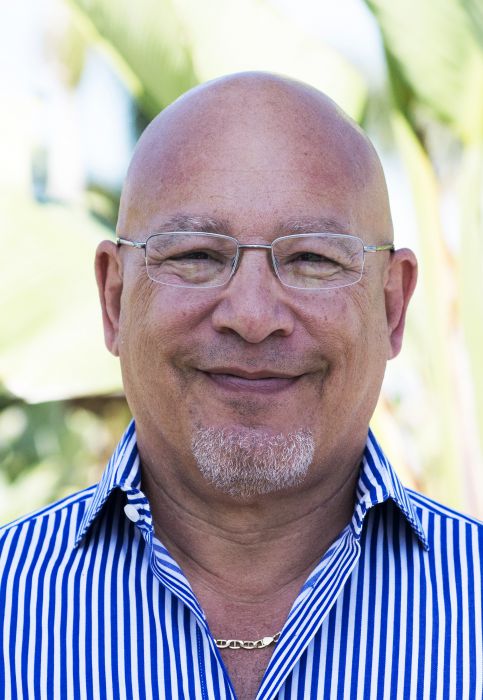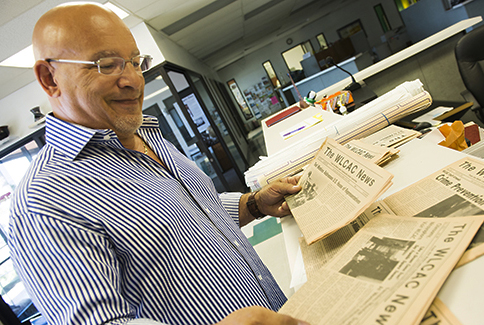
Timothy Watkins’ love for Watts and its people is in his blood, and has flowed through the veins of his family for decades.
Watkins is fourth president and CEO of the Watts Labor Community Action Committee (WLCAC). The organization “sprang to life” in 1965 in the wake of the Watts Rebellion from the compassion and drive of his father Ted Watkins, Sr. to improve the quality of life in the area through community service, job training, youth and seniors services, housing initiatives, and a variety of other programs.
“My father was a remarkable man. He was a genius in many ways, and he taught me the lessons I know about leadership–first and foremost, ‘If something needs to be done, just do it,” said Watkins. “He also told me, ‘Lead, follow, or get out of the way;’ the WLCAC has been leading for 50 years. Sometimes we get a little flack because we are unwilling to get out of the way, but we will always ask folks to join us, and we’re never going to stop doing what we do.”
Watkins will receive the Community Impact Award on behalf of the WLCAC during California State University, Dominguez Hills’ (CSUDH) Founders’ Dinner on Oct. 8. The dinner, which is part the university’s year-long 50th Anniversary Watts Rebellion Commemoration, will recognize the rebellion by highlighting the university’s role as a catalyst for change in its aftermath, and by honoring those–like Watkins and the WLCAC–who have made an impact in the community.
A Legacy from the Ashes
What would become the WLCAC began as a move to help local unions find solutions for the many long-standing issues of inequality in the workforce, as well as the lack of work, education and health care that existed in Watts and South Los Angeles during the turbulent Civil Rights Era.
Watkins’ father, a long-time resident of Watts and employee of the Ford Motor Company who was rising through the ranks of the United Auto Workers Union, was asked by the union to see what could be done for the community.
“Before it was the WLCAC, it really began in 1964 with my father advocating for farm workers in Delano, California, working with Cesar Chavez. Then an effort was mounted to organize the Watts Labor Community Action Committee,” said Watkins, who has lived in Watts his entire life. “In mid-1965 the revolt happened, and the organization sprang to life in the void left from the destruction.”
Watkins, who witnessed the Watts Rebellion firsthand–including a murder–believes that higher education and health care stood out among the many needs of community at the time.
“Some of the issues that were brought to life were people’s desperate need for local health care services, for higher learning opportunities, to feed themselves, and to aspire to careers,” he said.
“All of those things were revealed by the revolt, and in its aftermath, the WLCAC came to be and addressed many of those needs,” Watkins added. “Cal State Dominguez Hills was also a direct result of the 1965 revolt, which became a major component in our new higher education trio: the community college [Los Angeles Southwest College], the medical school [Charles R. Drew University of Medicine and Science] and the university [CSUDH].”
The building of the Martin Luther King, Jr. Community Hospital in Watts was also a direct result of the Watts Rebellion.

Family Values
After 35 years of volunteering at WLCA in many capacities, including purchasing agent, merchandising manager, fleet maintenance manager, landscape designer and builder, Watkins was elected as president and CEO of WLCAC in 2000. Watkins and the organization continues its mission to breathe life into the community through programs developing during his father’s time, as well as such programs and projects as sustainable community development, such as the McCoy Villa housing complex for homeless families, South L.A.’s first urban farm, Mudtown Farms, and cultural engagement through its center.
Today, Mudtown Farms “serves as a model for other community development corporations to follow.” Its staff and volunteers “hold the hands” of more than 30,000 people in need a year by “providing a place to sleep, food to eat, money to earn and love to grow.”
Watkins also continues to develop build and lead new coalitions and organizations for the benefit of Watts, such as the Greater Watts Development Corporation (GWDC), a WLCAC Corporate subsidiary; the Greater Watts Transportation Corporation (GWTC); the Watts Public Policy Institute and the Watts Renaissance Project, a community-based coalition of grass-root organizations and individuals dedicated to responsible planning and development in Watts.
“What needs to be done is to continue to create institutional alliances, partnerships, collaborations–just coming together to unite around common interests. Certainly the shared legacies of the WLCAC, Cal State Dominguez Hills, Drew University and others can work to fortify each other. Institutional relationships are key to not only building coalitions, but to revealing resources that we possibly didn’t know we even had. There is so much to gain by sharing cultural and historic experience.”
Watkins is well aware of the challenges Watts and its residents must still overcome to develop into a thriving city that is prosperous and safe for both its residents and visitors, but he also sees a lot of hope and opportunity within the community.
“My dream for Watts is it becomes a community where anyone can work, live or play. That we no longer have a need for guns, not only in the hands of law enforcement officers, but in the hands of youngsters who have given up so much hope that they’re willing to die for crumbs,” he said. “I want this to be a place that’s safe, that’s loving, that’s caring, and that’s prepared to be hospitable to visitors. We’re looking for good partners to help us evolve, a cultural tourism industry that also benefits people from here, yet beckons many thousands more.”